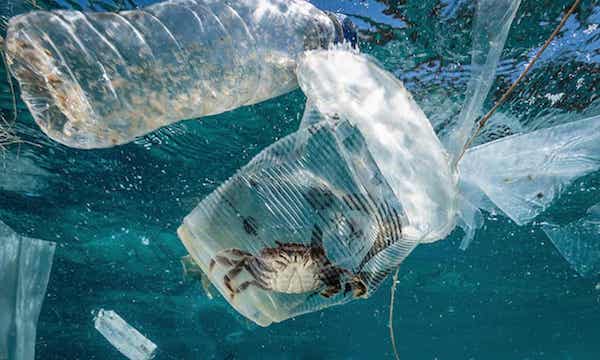
Andre Derain The port of Collioure 1905

• US adds 1,568 #coronavirus deaths in 24 hours. Total deaths 80,037
• Significant progress in slowing growth in India, today 3,115 with plateau for 5 days at about 3,000 cases after earlier rapid increase.
• Pakistan has rapid increase from 1,165 three days ago doubling to 2,301 today.

• Cases 4,121,778 (+ 89,015 from yesterday’s 4,032,763)
• Deaths 280,868 (+ 4,191 from yesterday’s 276,677)

From Worldometer yesterday evening -before their day’s close-
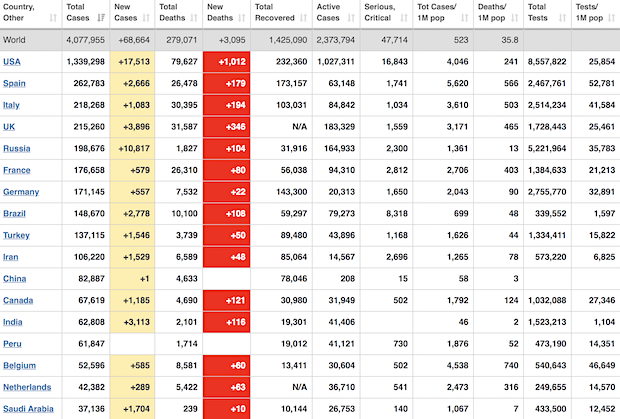
From Worldometer
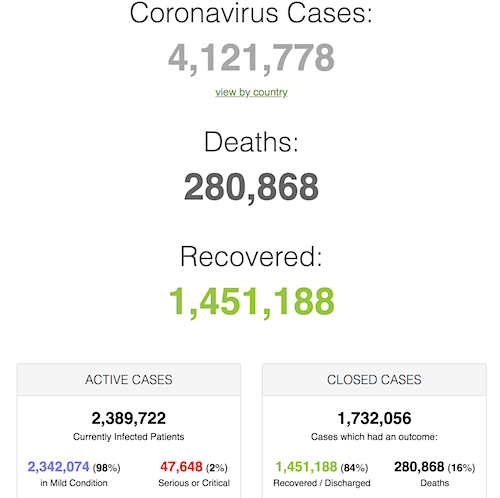
From SCMP:
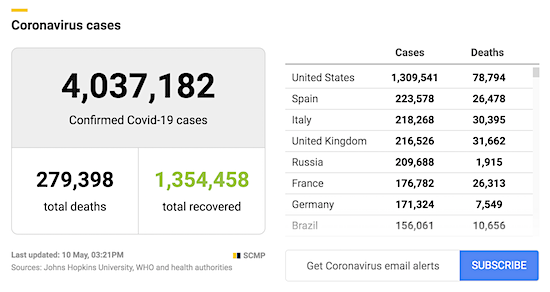
From COVID19Info.live:
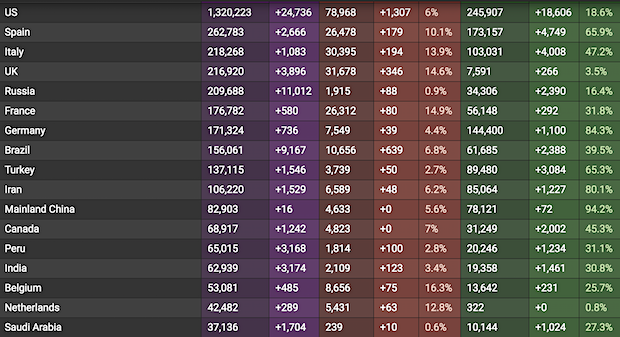

First point of Crushing the Curve. Re: New Zealand. As long as air travel is the no. 1 mode of transport, it’s relatively easy to do, and to prove as well. But too late now. Next up: testing.
• Closing Borders Is The Most Effective Way Of Combatting Coronavirus (SN)
Scientists in Brazil have found that the countries most affected by the coronavirus spread are the ones who continued to allow unrestricted travel across their borders, prompting further arguments that the most effective method of preventing the spread is tighter frontier controls. The research, carried out by the Federal University of Bahia in Salvador, suggests that screening and quarantining those coming into countries from outside could have been “a cheap solution for humanity”. The researchers based their analysis on records of 7,834 airports, using online flight databases documenting 67,600 transport routes in 65 countries.
The scientists factored in a number of forces, including climate, socioeconomic factors, as well economic and air transport, in an attempt to ascertain how the size of outbreaks was affected in 65 countries which had more than 100 cases. The overwhelming factor was found to be air travel, leading to a conclusion that it is “the main explanation for the growth rate of COVID-19.” The study notes that “The 2019 – 2020 world spread of COVID-19 highlights that improvements and testing of board control measures (i.e. screening associated with fast testing and quarantine of infected travellers) might be a cheap solution for humanity in comparison to health systems breakdowns and unprecedented global economic crises that the spread of infectious disease can cause.”
The data tallies with the fact that the US and the UK, which have the first and third highest air travel globally, have also suffered the most COVID-19 deaths with 74,600 and 30,615, respectively so far. The US did not close its airports until late March, while Britain’s borders have remained completely open with little to no testing or quarantining of incoming travellers happening at all. On the other hand, nations like Austria, Denmark and New Zealand closed their borders within days of their first confirmed cases, and have experienced much fewer deaths. Austria in particular has enacted tight border controls, refusing entry to anyone without a medical certificate confirming they had tested negative for the virus, and placing a mandatory 14 day quarantine on those who do not have them. The country has suffered just 68 deaths per million of its population, with only 606 overall.
Denmark closed its borders to all non-citizens in mid March, only excluding those with ‘credible purpose’ such as non-citizen Danish residents. The Scandinavian nation has recorded just 503 deaths. The UK, on the other hand has allowed some 18 million people to enter from outside the country with hardly any of them undergoing health screenings or being put into quarantine. Labour MP Stephen Doughty noted that “The fact that many of these people then likely arrived and travelled onwards across the UK with little or no adherence to social distancing, and with no checks or protections at the border is deeply disturbing.” The UK has seen 100,000 people arriving from foreign countries at UK airports every single week, all with virtually no health checks whatsoever.
Canada, UK, Sweden, US must step up to join the winners.
Visit https://t.co/1Tqhs475WB for a more detailed list, and https://t.co/pUw6vJ4omJ to see US states and territories. pic.twitter.com/4fBebG0px4
— Yaneer Bar-Yam (@yaneerbaryam) May 9, 2020

A good point. But you’re not making it better by blaming things on the “conservative movement”, or by dragging climate change into the topic.
• Accepting Death Is Not an Option (Kahn)
The worst-case scenario with coronavirus is not mass death. It’s that people come to accept mass death—to accept that someone will die in the U.S. every 30 seconds as “just how it is.” Yet that is the proposition being thrust on us now. Yesterday, 2,746 people died of covid-19 in the U.S., the highest daily death toll recorded since the first confirmed deaths on American soil in February. That’s on the high end of leaked Trump administration forecasts for this time period and shows the 3,000 daily deaths come June in those forecasts might be wishful thinking. This is, in a word, horrific. But the Trump administration and its backers from conservative media to the small but vocal “reopen” movement are trying to convince people it’s not only normal but worth it.
They have turned the idea we should avoid the Bad Thing—namely, the needless deaths of thousands of Americans—on its head, arguing we should embrace it full-on and just plow forward with reopening the country. It’s a monstrous idea in the here and now, but it also sets up a dangerous precedent, priming people to accept policy failure—or, worse, reject legitimate policy solutions—on what remains the biggest issue facing humanity: climate change. Unless we demand more from our leaders and each other, we risk an even bigger catastrophe in our lifetimes. There is nothing acceptable about 3,000 people dying every day from coronavirus. What’s so nauseating about this is that we know what it looks like to contain the virus.
We’ve seen it in action. Countries as diverse as South Korea, New Zealand, and Vietnam have all successfully flattened the curve of death and suffering. The steps they broadly followed are proactive lockdowns and a slow reopening as the curve of infections flattened followed by contact tracing, mass testing, and ensuring frontline workers have ready access to personal protective equipment.


Even if herd immunity were achievable, and this takes the fattest question mark you have ever seen, we don’t need it anymore than we need a vaccine. Which is good, because we have neither.
• Early Herd Immunity: A Dangerous Misconception (Johns Hopkins)
We have listened with concern to voices erroneously suggesting that herd immunity may “soon slow the spread” of COVID-19. For example, Rush Limbaugh recently claimed that “herd immunity has occurred in California.” As infectious disease epidemiologists, we wish to state clearly that herd immunity against COVID-19 will not be achieved at a population level in 2020, barring a public health catastrophe. Although more than 2.5 million confirmed cases of COVID-19 have been reported worldwide, studies suggest that (as of early April 2020) no more than 2-4% of any country’s population has been infected with SARS-CoV-2 (the coronavirus that causes COVID-19). Even in hotspots like New York City that have been hit hardest by the pandemic, initial studies suggest that perhaps 15-21% of people have been exposed so far.
In getting to that level of exposure, more than 17,500 of the 8.4 million people in New York City (about 1 in every 500 New Yorkers) have died, with the overall death rate in the city suggesting deaths may be undercounted and mortality may be even higher. Some have entertained the idea of “controlled voluntary infection,” akin to the “chickenpox parties” of the 1980s. However, COVID-19 is 100 times more lethal than the chickenpox. For example, on the Diamond Princess cruise ship, the mortality rate among those infected with SARS-CoV-2 was 1%. Someone who goes to a “coronavirus party” to get infected would not only be substantially increasing their own chance of dying in the next month, they would also be putting their families and friends at risk.
COVID-19 is now the leading cause of death in the United States, killing almost 2,000 Americans every day. Chickenpox never killed more than 150 Americans in a year. To reach herd immunity for COVID-19, likely 70% or more of the population would need to be immune. Without a vaccine, over 200 million Americans would have to get infected before we reach this threshold. Put another way, even if the current pace of the COVID-19 pandemic continues in the United States – with over 25,000 confirmed cases a day – it will be well into 2021 before we reach herd immunity. If current daily death rates continue, over half a million Americans would be dead from COVID-19 by that time.
As we discuss when and how to phase in re-opening, it is important to understand how vulnerable we remain. Increased testing will help us better understand the scope of infection, but it is clear this pandemic is still only beginning to unfold.

Someone tries to claim that less than a million tests per day will be enough.
• US COVID19 Test Results: Third Consecutive Day Over 300K (CR)
The US might be able to test 400,000 to 600,000 people per day sometime in May according to Dr. Fauci – and that might be enough for test and trace. However, the US might need more than 900,000 tests per day according to Dr. Jha of Harvard’s Global Health Institute. There were 300,842 test results reported over the last 24 hours. This data is from the COVID Tracking Project. The percent positive over the last 24 hours was 8.4% (red line). The US probably needs enough tests to push the percentage positive below 5%. (probably much lower based on testing in New Zealand).


Singapore is not the greatest example. It had another 876 new cases yesterday.
• Over 1 Out of Every 1000 People in NY and NJ Die From COVID19 (Mish)
New Jersey joined New York today in the dubious distinction of coronavirus deaths rates of over 1 in 1,000 people. As states start opening up here are some charts to consider. The chart is not population adjusted. I made the chart as a spot check to see if new deaths were generally in line with the lead chart. There are some new states, notably Texas and Florida, but they are not in the front of the pack, and the day-to-day totals are very noisy.

Three Obvious Standouts • Singapore • South Korea • Japan.
Singapore , South Korea, and Japan all did three things that the US did not do and many in the US still do not want to do.
1) Aggressive Early Testing
2) Cooperative Society on Social Distancing Rules
3) Contact Tracing
1: The US did not do aggressive early testing and it’s too late for that now.
2: The US was late in social distancing and some want to fight it
3: The US did not do contact tracing and may still view that as violation of personal privacy.
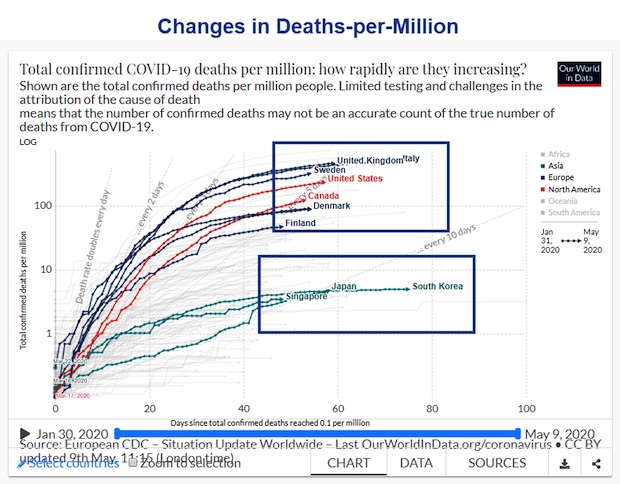
Too Late for Early Testing, But Not Overall Testing: Most do want aggressive testing, but despite Trump’s claims, the US is not where we need to be. However, the number of tests is finally ramping up. Coupled with spotty social distancing (compared to other countries) Is that enough? I don’t know, but we are about to find out.

Guess the bankers are satisfied for a few weeks.
• Trump Says ‘No Rush’ On More Aid As Jobless Crisis Grows (AP)
President Donald Trump says he’s in “no rush” to negotiate another financial rescue bill, even as the government reported that more than 20 million Americans lost their jobs last month due to economic upheaval caused by the coronavirus. The president’s low-key approach came Friday as the Labor Department reported the highest unemployment rate since the Great Depression and as Democrats prepared to unveil what Senate Democratic leader Chuck Schumer calls a “Rooseveltian-style” aid package to shore up the economy and address the health crisis. Some congressional conservatives, meanwhile, who set aside long-held opposition to deficits to pass more than $2 trillion in relief so far, have expressed reservations about another massive spending package.
“We’ve kind of paused as far as formal negotiations go,” Larry Kudlow, the director of the National Economic Council told reporters Friday. He said the administration wanted to let the last round of recovery funding kick in before committing to hundreds of billions or more in additional spending. “Let’s have a look at what the latest round produces, give it a month or so to evaluate that.” Kudlow added that talks were in a “lull” and that administration officials and legislators would “regroup” in the next several weeks. Still, White House aides are drawing up a wish-list for a future spending bill, including a payroll tax cut, liability protection for businesses that reopen and potentially billions in infrastructure spending.
Kudlow added that the White House was also considering allowing businesses to immediately expense the costs of modifiying their facilities to accommodate public safety measures necessary to reopen. The notion was brought up on a call with House members advising the White House on reopening plans Thursday evening and drew bipartisan support. “We’re in no rush, we’re in no rush,” Trump told reporters Friday during an event with House Republicans. He called on Democratic-controlled House to return to Washington, adding, “We want to see what they have.”
https://twitter.com/SamRo/status/1259268788165513219

One guy “meets” 1,500 people in one day, infects 42.
• South Korea Reports 34 New Coronavirus Cases, Highest In A Month (R.)
South Korea reported 34 new coronavirus cases on Sunday, the highest daily number in a month, after a small outbreak emerged around a slew of nightclubs that a confirmed patient had visited. Of the new cases, 26 were domestically transmitted infections and eight were imported cases, the Korea Centers for Disease Control and Prevention (KCDC) said. Sunday’s total was the highest since April 9. After battling the first major epidemic outside China, South Korea posted zero or very few domestic cases over the past 10 days, with the daily tally hovering around 10 or less in recent weeks.
The resurgence followed a small but growing coronavirus outbreak centred around a handful of Seoul nightclubs, which a man in his late 20s had visited before testing positive for the virus. At least 15 people were traced to that man as of Friday, and 14 of the 26 cases were reported from Seoul on Sunday, although the KCDC did not specify how many were linked. The outbreak prompted Seoul city to impose an immediate temporary shutdown of all nightly entertainment facilities on Saturday. The city said it is tracking down abut 1,500 people who have gone to the clubs, and has asked anyone who was there last weekend to self-isolate for 14 days and be tested.

Time for more lockdowns.
• China Reports 14 New Confirmed Coronavirus Cases, Most in 2 Weeks (R.)
China’s National Health Commission reported 14 new confirmed coronavirus cases on May 9, the highest number since April 28, including the first for more than a month in the city of Wuhan where the outbreak was first detected late last year. While China had officially designated all areas of the country as low-risk last Thursday, the new cases according to data published on Sunday represent a jump from the single case reported for the day before. The number was lifted by a cluster of 11 in Shulan city in northeastern Jilin province.
Jilin officials on Sunday raised the Shulan city risk level to high from medium, having hoisted it to medium the day before after one woman tested positive on May 7. The 11 new cases made public on Sunday are members of her family or people who came into contact with her or family members. The new Wuhan case, the first reported in the epicentre of China’s outbreak since April 3, was previously asymptomatic, according to the health commission. Aside from the Shulan cluster and the Wuhan case, the remaining two new confirmed cases were imported infections. It also said newly discovered asymptomatic cases were at 20, the highest since May 1 and up from 15 a day earlier.
America is so far behind in both embracing the level of behavoral change required and developing the tools and systems required to implement it pic.twitter.com/hdTURBksdg
— Michael Carney (@mcarney) May 7, 2020

Is this why Tedros didn’t declare a pandemic for another 7 weeks after?
• China Asked WHO To Cover Up Coronavirus Outbreak: German Intelligence (TN)
Chinese leader Xi Jinping asked World Health Organization (WHO) Director-General Tedros Adhanom Ghebreyesus to suppress news about the Wuhan coronavirus (COVID-19) outbreak, the German intelligence agency BND found, according to a report by German magazine Der Spiegel. During a conversation on Jan. 21, Xi reportedly asked Tedros not to announce that the virus could be transmitted between humans and to delay any declaration of a coronavirus pandemic. It took until the end of January before the WHO declared that the coronavirus outbreak needed to receive international attention.
Because of China’s delay, the world wasted four to six weeks it could have used better to counter the virus from spreading, the BND concluded. Germany’s Robert Koch Institute also said that China failed to reveal all relevant information at the outset of the epidemic, leading it to turn to the BND for advice, according to a report in the Sueddeutsche Zeitung quoted by CNA. In a response to the German media reports, Chinese diplomats said the opposite was true, arguing that the communist country’s handling of the virus saved time that was then wasted by other governments.

Keeping the borders shut would risk “permanently damaging cross-border coexistence”. But exporting the virus from one country to the next would not?
• Top German Politician Wants To ‘Urgently’ Reopen French Border (RT)
The head of Germany’s most populous state has called for the reopening of the country’s French border to be fast-tracked. The federal government earlier warned that such actions risk launching a new wave of Covid-19 infections. “We urgently need to open the border with France,” Armin Laschet, minister president of the country’s North Rhine-Westphalia state, which borders France, told German media. The lockdown there ends on May 11. That would be a good time to send a signal to our neighbors that we are striving for a common European response to the pandemic. Laschet suggested that the German government should also “talk to Austria in this sense.”
France is due to initiate its first phase of relaxing quarantine rules on Monday. However, Interior Minister Christophe Castaner said earlier this week that the border will remain closed until at least June 15. The German government has been under pressure to lift restrictions on international travel early as some European countries begin to gradually ease their lockdowns. A group of German lawmakers and members of the European Parliament have called on Interior Minister Horst Seehofer to fast-track the reopening of the border crossings. The foreign minister of the small nation of Luxembourg, Jean Asselborn, has also written a letter to Seehofer, arguing that the shutdown of the border crossings is causing “growing discontent” among the population on both sides of the border and risks “permanently damaging cross-border coexistence” in the region.

And how does one define “under control”? “.. the number of fresh cases has dropped by more than half across the region..”
• Corona Under Control: Bavaria Lets Residents Go Out & Businesses Reopen (RT)
Despite warnings the Covid-19 crisis isn’t over, one of Germany’s wealthiest states is set to open up, allowing people to go out for any reason and letting almost all businesses – from retail to tourism – welcome visitors again. “Now it is time to act,” proclaimed Bavaria’s Prime Minister Markus Soeder as he rolled out“a path of reason” for the wealthy Alpine state. “In the beginning we had an explosive [rate of] infection,” Soeder admitted, adding though that “coronavirus is now under control.” Bavaria claims almost one-quarter – over 43,000 – of all confirmed coronavirus infections in Germany, but the number of fresh cases has dropped by more than half across the region, he said, explaining why relaxing the lockdown is an option. The current figures “allow for careful steps toward opening up,” provided that a “combination of caution and freedom” prevail.
Starting from May 6, Bavarians can visit anyone outside their own household. Seeing relatives in nursing homes will also become possible this weekend, although strict rules will remain in place, with visitors still having to wear masks at all times and meet their loved ones outdoors wherever possible. From May 11, zoos, botanical gardens, museums, libraries, galleries, exhibitions, and memorials will likewise open their doors – but only conditionally, meaning that their staff will have to accommodate social distancing and coronavirus hygiene measures. Supermarkets and stores with premises bigger than 800 square meters are also cleared to resume their activities. Locals will be able to more fully enjoy the outdoors in the second half of May when the state-wide ban on open-air dining is lifted. Bavaria, on a par with a handful of other German states, is also allowing hotels and leisure places to welcome visitors again, to much relief of its tourism industry.

They’re risking the country falling apart. Just like the US does.
• German Towns Bring Back Lockdown After Infections Spike Within Days (DM)
Local authorities in Germany are bringing back lockdown measures after coronavirus infections spiked just days after Angela Merkel started to ease them. Germany has 16 federal states, with the power to relax restrictions, who have all agreed to reimpose lockdown if new cases hit 50 per 100,000 people over seven days. The regional government in North Rhine-Westphalia, Germany’s most populated state, recorded a spike in coronavirus cases after 150 of 1,200 employees tested positive at a slaughterhouse in Coesfeld. The regional government has postponed reopening restaurants, tourist spots, fitness studios and larger shops which was supposed to happen on May 11.
Reopening schools and daycare centres is set to go ahead as planned. North Rhine-Westphalia’s health minister Karl-Josef Laumann said the slaughterhouse infection rate had pushed the region above 50 per 100,000 people to 61 per 100,000 people. He closed the slaughterhouse temporarily and said employees at all of the state’s meat processing plants would be tested. A different slaughterhouse in the northern state Schleswig-Holstein also saw a rise in employees testing positive for the virus taking the district’s infection rate over the 50 per 100,000 people threshold. In the eastern state of Thuringia, the local government recorded more than 80 infections per 100,000 people over the past week.
The majority of these infections were among employees and residents in six care homes and one geriatrics hospital. Martina Schweinsburg, the chief administrator of Thuringia’s Greiz, said: ‘To be clear: We’re not going to put the entire district in quarantine just two small towns were particularly affected.’

Note: the photo apparently wasn’t taken on May 2, but the day after during a re-enactment.
• Facebook Censors Iconic Photo With Soviet Flag Raised Over Reichstag (RT)
Social media feeds are filled with historic shots marking Victory Day, but Facebook seems to have taken issue with one that symbolizes the Soviet victory over Nazi Germany, and it keeps deleting a recently-colorized version of it. Taken during the Battle of Berlin on May 2, 1945, Yevgeny Khaldei’s ‘Raising a Flag over the Reichstag’ commonly springs to mind when it comes to the subject of World War II and Victory Day celebrations. It universally appears in literature, documentaries and, indeed, in social media posts. RT has even reenacted the iconic moment as part of its V-Day project.
All the more puzzled, then, were social media users who tried posting the iconic shot on Facebook on May 9, as Russia marked 75 years since the defeat of Nazi Germany. While the vintage black-and-white versions of the famous photo seemed to pass FB algorithms with flying colors, the version skilfully colorized by Olga Shirnina (aka Klimbim) –showing the Soviet flag in its original bright red– set off alarm bells. “Your post goes against our Community Standards on dangerous individuals and organisations,” was the message shown to several RT employees who’d set out to verify the reports and tried to post the picture. The warning appeared minutes after posts were completed, after which the image just vanished altogether.
Details provided in the warning only broadly outline the topics banned on FB, such as terrorism and incitement of hate and violence. There is no indication that FB has ever consistently associated the Soviet symbols with any on the list, although the network does have a history of erroneously censoring certain historic shots.

Yevgeny Khaldei – 75 years ago the Soviet banner was raised over the Reichstag. 11 million Soviet soldiers died in WW2 and three-quarters of German losses were suffered at the hands of the Red Army – May 2 1945

Just link it to the euro.
• Swiss National Bank Battling Enormous Pressure On Safe-Haven Franc (R.)
The Swiss National Bank has no alternative to its ultra-expansive monetary policy, with the coronavirus crisis heaping “enormous” appreciation pressure on the safe-haven Swiss franc, SNB Chairman Thomas Jordan said in newspaper interviews. The SNB was not happy about the negative interest rate of minus 0.75% it charges banks who park money with it overnight, Jordan told the SonntagsZeitung paper. It would lift the rates — the lowest in the world — as soon as circumstances allowed, he said, although this was currently impossible. “We unfortunately have no choice but to maintain the negative interest rate,” said Jordan. “Without it, we would be in a much more difficult situation now.
“The Swiss franc would be massively more attractive and the financing conditions for the Swiss economy would be much worse,” he added. “The negative interest is necessary at the moment to avert major damage to Switzerland.” The SNB was also stepping up foreign currency purchases to dampen the rise of the franc, Jordan said. Sight deposits at the central bank, a proxy for SNB interventions, have risen by nearly 77 billion Swiss francs ($79.33 billion) this year, while the franc has risen to its highest level against the euro since July 2015. “We have emphasized several times … we are active in the foreign exchange markets to reduce the pressure on the Swiss franc,” Jordan told the paper.
“We deliberately never report our transactions in detail, but I would like to emphasise that we are making a substantial commitment,” he said. All this was necessary to prevent the franc from strengthening, hurting Switzerland’s export-orientated economy and triggering deflation.

It certainly is. But not in the way he means.
• Obama Says That ‘Rule Of Law Is At Risk’ In Michael Flynn Case (Y!)
Former President Barack Obama, talking privately to ex-members of his administration, said Friday that the “rule of law is at risk” in the wake of what he called an unprecedented move by the Justice Department to drop charges against former White House national security adviser Michael Flynn. In the same chat, a tape of which was obtained by Yahoo News, Obama also lashed out at the Trump administration’s handling of the coronavirus pandemic as “an absolute chaotic disaster.” “The news over the last 24 hours I think has been somewhat downplayed — about the Justice Department dropping charges against Michael Flynn,” Obama said in a web talk with members of the Obama Alumni Association.
“And the fact that there is no precedent that anybody can find for someone who has been charged with perjury just getting off scot-free. That’s the kind of stuff where you begin to get worried that basic — not just institutional norms — but our basic understanding of rule of law is at risk. And when you start moving in those directions, it can accelerate pretty quickly as we’ve seen in other places.” The Flynn case was invoked by Obama as a principal reason that his former administration officials needed to make sure former Vice President Joe Biden wins the November election against President Trump. “So I am hoping that all of you feel the same sense of urgency that I do,” he said.
“Whenever I campaign, I’ve always said, ‘Ah, this is the most important election.’ Especially obviously when I was on the ballot, that always feels like it’s the most important election. This one — I’m not on the ballot — but I am pretty darn invested. We got to make this happen.” Obama misstated the charge to which Flynn had previously pleaded guilty. He was charged with false statements to the FBI, not perjury. But the Justice Department, in a filing with a federal judge on Thursday, asked that the case brought by special counsel Robert Mueller be dismissed, arguing that FBI agents did not have a justifiable reason to question the then national security adviser about his conversations with Russian Ambassador Sergei Kislyak — talks FBI agents and Mueller’s prosecutors concluded he had lied about.

We try to run the Automatic Earth on people’s kind donations. Since their revenue has collapsed, ads no longer pay for all you read, and your support is now an integral part of the process.
Thank you.

Libertarianism reposes on the nonagression principle, which COMMANDS mask-wearing under the SILVER RULE.
— Nassim Nicholas Taleb (@nntaleb) May 9, 2020

Watch: @DavidDavisMP speaking today: "Assange is a symbol of the American State's affront at having its secrets put out in the public domain. It's a political case" pic.twitter.com/I0MDhE5E8i
— WikiLeaks (@wikileaks) May 9, 2020

Just a little "Me" time! pic.twitter.com/t8gQz9VzOn
— Life on Earth (@planetpng) May 9, 2020

Support the Automatic Earth in virustime.



